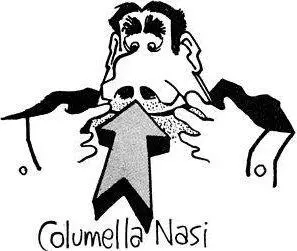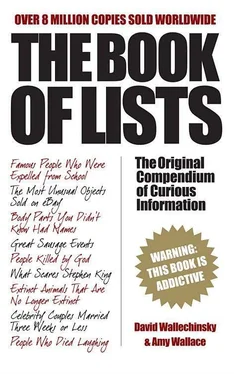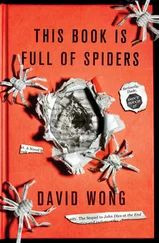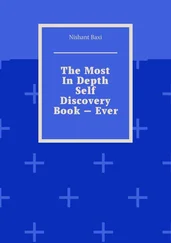—
The Big Sleep , Raymond Chandler
‘It was the devious-cruising Rachel, that in her retracing search after her missing children, only found another orphan.’
—
Moby Dick , Herman Melville

© Paul Glover
COLUMELLA NASI
23 OBSCURE AND OBSOLETE WORDS
The average adult recognises 30,000 to 50,000 words, but only uses 10,000 to 15,000. However, there are actually about 1 million words in the English language, some of which — although obscure, forgotten, or rarely used — are worth reviving.
• BOANTHROPY — A type of insanity in which a man thinks he is an ox.
• CHANTEPLEURE — To sing and weep at the same time.
• DIBBLE — To drink like a duck, lifting up the head after each sip.
• EOSOPHOBIA — Fear of dawn.
• EUGERIA — Normal and happy old age.
• EUNEIROPHRENIA — Peace of mind after a pleasant dream.
• EYESERVICE — Work done only when the boss is watching.
• FELLOWFEEL — To crawl into the skin of another person so as to share his feelings, to empathise with.
• GROAK — To watch people silently while they are eating, hoping they will ask you to join them.
• GYNOTIKOLOBOMASSOPHILE — One who likes to nibble on a woman’s earlobes.
• HEBEPHRENIC — A condition of adolescent silliness.
• IATROGENIC — Illness or disease caused by doctors or by prescribed treatment.
• LAPLING — Someone who enjoys resting in women’s laps.
• LIBBERWORT — Food or drink that makes one idle and stupid, food of no nutritional value, ‘junk food’.
• MEUPAREUNIA — A sexual act gratifying to only one participant.
• NEANIMORPHIC — Looking younger than one’s years.
• ONIOCHALASIA — Buying as a means of mental relaxation.
• PARNEL — A priest’s mistress.
• PERISTEROPHOBIA — Fear of pigeons.
• PILGARLIC — A bald head that looks like a peeled garlic.
• PREANTEPENULTIMATE — Fourth from last.
• RESISTENTIALISM — Seemingly spiteful behaviour manifested by inanimate objects.
• SUPPEDANEUM — A foot support for crucifix victims.
33 NAMES OF THINGS YOU NEVER KNEW HAD NAMES
1. AGLET
The plain or ornamental covering on the end of a shoelace.
2. A RMSAYE
The armhole in clothing.
3. CHANKING
Spat-out food, such as rinds or pits.
4. COLUMELLA NASI
The bottom part of the nose between the nostrils.
5. DRAGÉES
Small beadlike pieces of candy, usually silver-coloured, used for decorating cookies, cakes and sundaes.
6. FEAT
A dangling curl of hair.
7. FERRULE
The metal band on a pencil that holds the eraser in place.
8. HARP
The small metal hoop that supports a lampshade.
9. HEMIDEMISEMIQUAVER
A 64th note. (A 32nd is a demisemiquaver and a 16th note is a semiquaver.)
10-13. JARNS, NITTLES, GRAWLIX and QUIMP
Various squiggles used to denote cussing in comic books.
14. KEEPER
The loop on a belt that keeps the end in place after it has passed through the buckle.
15. KICK or PUNT
The indentation at the bottom of some wine bottles. It gives added strength to the bottle but lessens its holding capacity.
16. LIRIPIPE
The long tail on a graduate’s academic hood.
17. MINIMUS
The little finger or toe.
18. NEF
An ornamental stand in the shape of a ship.
19. OBDORMITION
The numbness caused by pressure on a nerve; when a limb is ‘asleep’.
20. OCTOTHORPE
The symbol ‘#’ on a telephone handset. Bell Labs’ engineer Don Macpherson created the word in the 1960s by combining octo-, as in eight, with the name of one of his favourite athletes, 1912 Olympic decathlon champion Jim Thorpe.
21. OPHRYON
The space between the eyebrows on a line with the top of the eye sockets.
22. PEEN
The end of a hammer head opposite the striking face.
23. PHOSPHENES
The lights you see when you close your eyes hard. Technically, the luminous impressions are due to the excitation of the retina caused by pressure on the eyeball.
24. PURLICUE
The space between the thumb and extended forefinger.
25. RASCETA
Creases on the inside of the wrist.
26. ROWEL
The revolving star on the back of a cowboy’s spurs.
27. SADDLE
The rounded part on the top of a matchbook.
28. SCROOP
The rustle of silk.
29. SNORKEL BOX
A mailbox with a protruding receiver to allow people to deposit mail without leaving their cars.
30. SPRAINTS
Otter dung.
31. TANG
The projecting prong on a tool or instrument.
32. WAMBLE
Stomach rumbling.
33. ZARF
A holder for a handleless coffee cup.
– S.B. & D.W.
18 SAYINGS OF OSCAR WILDE
Born in Dublin and educated at Oxford, Oscar Wilde (1854–1900) wrote one novel, The Picture of Dorian Gray , and a number of successful plays, including Lady Windermere’s Fan and The Importance of Being Earnest . Considered the master of social comedy, Wilde was an expert craftsman of witty sayings and paradoxes. Even on his deathbed, as he sipped champagne, he quipped, ‘I am dying beyond my means.’
• Murder is always a mistake. One should never do anything that one cannot talk about after dinner.
• I don’t recognise you — I’ve changed a lot.
• Always forgive your enemies — nothing annoys them so much.
• The idea that is not dangerous is unworthy of being called an idea at all.
• To love oneself is the beginning of a lifelong romance.
• Anybody can sympathise with the sufferings of a friend, but it requires a very fine nature to sympathise with a friend’s success.
• When one is in love, one always begins by deceiving oneself; and one always ends by deceiving others. That is what the world calls a romance.
• To get back my youth I would do anything in the world, except take exercise, get up early, or be respectable.
• I can resist anything except temptation.
• What is a cynic? A man who knows the price of everything and the value of nothing.
• Experience is the name everyone gives to their mistakes.
• We are all in the gutter, but some of us are looking at the stars.
• There is a luxury in self-reproach. When we blame ourselves we feel that no one else has a right to blame us.
• Only dull people are brilliant at breakfast.
• A cigarette is the perfect type of a perfect pleasure. It is exquisite, and it leaves one unsatisfied. What more can one want?
• Nothing succeeds like excess.
• In this world there are only two tragedies. One is not getting what one wants, and the other is getting it.
• Education is an admirable thing, but it is well to remember from time to time that nothing that is worth knowing can be taught.
16 WELL-KNOWN SAYINGS ATTRIBUTED TO THE WRONG PEOPLE
Читать дальше













